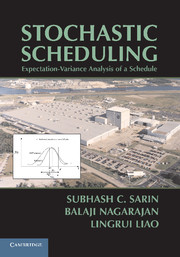Book contents
- Frontmatter
- Contents
- Foreword
- Preface
- STOCHASTIC SCHEDULING
- 1 Introduction
- 2 Robust Scheduling Approaches to Hedge against Processing Time Uncertainty
- 3 Expectation-Variance Analysis in Stochastic Multiobjective Scheduling
- 4 Single-Machine Models
- 5 Flow-Shop Models
- 6 Job-Shop Models
- 7 Parallel-Machine Models
- 8 The Case of General Processing Time Distribution
- 9 Concluding Remarks
- Appendix
- Bibliography
- Index
1 - Introduction
Published online by Cambridge University Press: 05 July 2014
- Frontmatter
- Contents
- Foreword
- Preface
- STOCHASTIC SCHEDULING
- 1 Introduction
- 2 Robust Scheduling Approaches to Hedge against Processing Time Uncertainty
- 3 Expectation-Variance Analysis in Stochastic Multiobjective Scheduling
- 4 Single-Machine Models
- 5 Flow-Shop Models
- 6 Job-Shop Models
- 7 Parallel-Machine Models
- 8 The Case of General Processing Time Distribution
- 9 Concluding Remarks
- Appendix
- Bibliography
- Index
Summary
Uncertainty
The realm of manufacturing is replete with instances of uncertainties in job processing times, machine statuses (up or down), demand fluctuations, due dates of jobs, and job priorities. These uncertainties stem from the inability to predict with sufficient accuracy information about product demand, job processing times, and occurrences such as unexpected machine breakdowns and arrivals/cancellations of orders. Although highly efficient forecasting methods are currently available, product demand errors invariably occur in the production system. Process variability is another significant factor that introduces variations and uncertainty into the manufacturing process.
Uncertainty is inarguably an undesirable factor in the manufacturing process because it does not give production managers complete control over the manufacturing process. Some of the ill effects of these uncertainties include system instability, excess inventory, customer dissatisfaction because due dates are not met, and, more important, loss of revenue. Recent advances in manufacturing management techniques, such as agile manufacturing, have made variability an important design criterion in order to ensure predictability and dependability of production systems. Agility is the ability of a system to thrive and prosper in an environment of constant and unpredictable change.
Uncertainty in Scheduling
As true as it would be with any other field within manufacturing, the uncertainty factor is of considerable importance in production scheduling. Scheduling is a decision-making process that plays an important role in most manufacturing as well as in most information-processing environments.
- Type
- Chapter
- Information
- Stochastic SchedulingExpectation-Variance Analysis of a Schedule, pp. 1 - 11Publisher: Cambridge University PressPrint publication year: 2010

